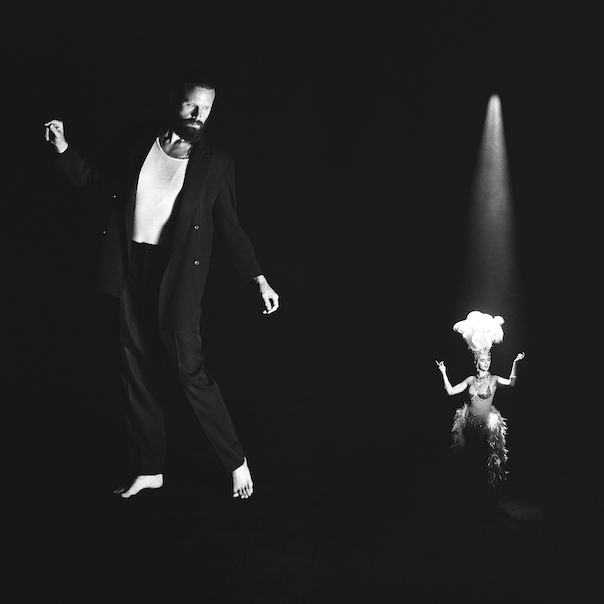REVIEW: Father John Misty tries out jazz on ‘Chloë and the Next 20th Century’

Father John Misty, “Chloe and the Next 20th Century.”
One could be forgiven for thinking Josh Tillman had become disenchanted with recording his own material. Tillman, who has recorded and performed as Father John Misty since 2012, hasn’t released an album of original material in four years. His last, 2020’s Anthem, was an EP of covers. Tillman is a notoriously difficult figure who’s not shy about his disillusionment with the entertainment industry. Despite the fact that Tillman has mocked jazz tropes before (see his “Jazz Imposters” social media posts), Chloë and the Next 20th Century, his fifth studio album as Father John Misty, relies heavily on elements of jazz.
Chloë and the Next 20th Century
Father John Misty
Sub Pop, April 8
8/10
This album is full of upright bass, brushed drumming and saxophone, while the singer croons about lost love. Yet the album maintains his familiar lyrical realism across 11 tracks, and the inspiration behind the material isn’t exactly clear. Father John Misty is a persona that Tillman has adopted in part to shield himself, like so many other artists before him. His songs are often dense and ironic; it’s not always clear what’s a joke and what’s serious with Father John Misty.
The album’s first track (also its namesake), “Chloë,” opens with a short trumpet solo, followed by a string section and lilting piano. The song builds, adding more and more instrumentation as it tells the story of Chloë, the “borough socialist” with a façade of glitz.
“Buddy’s Rendezvous” most resembles a torch song, with its slow burn (the deluxe edition of the album is packaged with a very apropos Lana Del Rey cover of “Buddy’s Rendezvous” on 7-inch single). “Whatever happened to the girl I knew,” Tillman laments, accompanied by woeful saxophones and minor piano chords. The song relays that when you end things with someone, it’s only a matter of time until you no longer know who that person is anymore.
“Olvidado (Otro Momento)” leans heavily into jazz-adjacent Bossa nova with its light, floaty percussion.
Despite the swerve into jazz, Tillman maintains his knack for storytelling on Chloë. With quirky callbacks to late-night television, “Funny Girl” paints the portrait of a charismatic woman whom people are effortlessly drawn to (including the narrator), but who seems to take up all the oxygen and fill all the space in the room with her personality. She’s a “five-foot Cleopatra” with a “manic smile.” There are details missing, but Father John Misty finds a way to tell you all you need to know about this girl in three and a half minutes.
“Kiss Me (I Loved You),” one of the strongest songs on the album, is another narrative about holding on to expired love that once was sweet, but has now soured. Tillman notes that the sky won’t fall if he spends another night with his now-lost love, pleading, “Our dream ended/ Like dreams do/ But kiss me/ Don’t you miss me?/ Kiss me/ I loved you.” This track also features one of the more poignant lines in the album: “Love’s much less a mystery/ Than who you give it to,” revealing the songwriter’s strength and the depth below the Father John Misty persona.
“Q4,” in the middle of the album, is another lyrical album highlight. “Goodbye Mr. Blue” is a Harry-Nilsson-esque number, which hews closer to rock, about the death of a shared pet bringing a couple together for the last time, and it has the kind of darkly funny lyrics for which Father John Misty is known: “This may be the last time/ The last time I lay here with you/ Do you swear it’s not the cat?/ You don’t have to answer that/ I’ll just make do.”
The final track, “The Next 20th Century,” is a seven-minute apocalyptic manifesto, offering every sound Tillman includes on the album, and touching on nazis playing in a wedding band, the fall of empire, and, for some reason, Val Kilmer. Lyrically, Tillman has a Jim-Morrison-like touch with this kind of sprawling epic that’s transfixing even in its ridiculousness.
“The boss wants to be anonymous/ The talent wants to be seen,” he sings. “We weren’t paying for your body, lord/ We were paying you to leave/ Now who will watch the chorus line stretching from Reno to Rome?”
Guitars come squealing in halfway through before fading out as suddenly as they appear, like a momentary storm on an otherwise calm day. He sounds resigned rather than put out by the revelation that, “But none of us here/ Will ever see the promised land.”
Josh Tillman is always stretching and pushing artistically, as though he’s trying to suss out how sturdy the walls he’s erected around himself are. Having abandoned self-serious folk rock for detached, psychedelia-tinged rock as Father John Misty, he now seems unsatisfied with being confined by genre, almost to the point of perversity.
Do casual Father John Misty fans who liked “Hollywood Cemetery Forever” want to hear a jazzy, Big Band, Bossa nova album from him? It seems unlikely, but it also seems unlikely that Tillman cares what the answer to that question truly is. While stylistically different from previous albums, Chloë and the Next 20th Century has a clear relationship to Tillman’s previous work as Father John Misty, with its winking lyricism and grandiose instrumentation.
Editor Rachel Alm contributed to this review. Follow writer Piper Westrom at Twitter.com/plwestrom.
